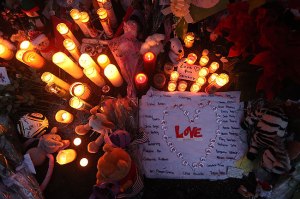
As mass shootings and other school killings continued to make headlines in 2013, this fall students at Marymount Manhattan College in New York City bravely took on a play about the 1999 Columbine High School shooting — Columbinus. Although the performers and crew were only seven or eight years old at the time, high school remains high school, and the 26 students in the cast ably re-created the atmosphere of an American school. They brought to life the cliques, flirtations, rough-housing, bullying, and the creation of social hierarchies that commonly take place in high school.
Several members of the Network for Peace staff went to Marymount to see the play, a complex interweaving of dialogue, music, movement and digital text that was projected on a large screen, the whole impressively acted and staged. The production gave us a lot to think about afterwards, particularly about the provocative questions director Craig Baldwin raised in the program’s director’s notes, which you can read below. What fundamental social change is needed to end such tragedies?
You can also learn more about the production from a blog created for the students’ reflections at columbinus.wordpress.com. You may be surprised (and dismayed?) to learn, as one student found in her research, that some young people today view shooters Klebold and Harris as heroes and fantasize emulating them.
–Peggy Ray
From the Director
“I’ve always tried to show people that the devil we blame our atrocities on is really each one of us.”
–Marilyn Manson
In the wake of a tragedy like the Columbine High School mass shooting, we inevitably find ourselves asking “why did this happen?” Frequently we look for the answer in external forces like heavy metal music (Marilyn Manson, for example), video games, violent movies, gun control, mental health programs, police procedures, school security, family values and so on. All these things might certainly afford some scrutiny, but Columbinus examines what theater examines best: ourselves. High School, like all our institutions, is a microcosm of our society and reflects all of our societal values, beliefs and prejudices. It is a mirror of our own cultural choices. Why do we fear difference? Why do we divide into cliques and declare war on each other? Why do we celebrate some expressions of violence and repress others? Who do we pay attention to? Who falls through the cracks? Do we listen to our children? Do we listen to each other? These are the kind of questions we have asked as we prepared this piece.
At least 75% of the text for this play is drawn from the actual words of survivors, parents, students, teachers and Dylan Klebold and Eric Harris themselves. At first it might seem like a terrifying prospect to hear testimonial from the actual people involved in this horrendous event – it may be easier not to think about an event like this and to sweep it under the carpet – but we have discovered that there is nothing more enlightening than hearing what these people actually said and wrote. Mass shootings continue to take innocent American lives month after month, year after year. The kind of fundamental cultural change we need to end these horrific tragedies will only happen if we have the courage as a community to stare down this fearful topic, put aside our fears and our differences and talk to each other – or more importantly, listen to each other. Columbinus brings the real words of these people back into the room so we can hear them embodied in front of us, as a community. Because, as Eric Harris said chillingly in the infamous “Basement Tapes” videos that he and Dylan Klebold recorded, “Silence is deadly. The longer the silence, the more deadly.”

Mass shootings are covert ops. There is even a profile for these types of crimes:
http://signofthetimes.yuku.com/topic/1355/Manipulated-Shootings-The-Profile